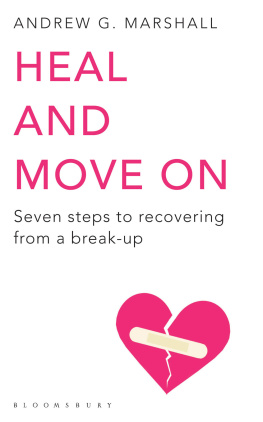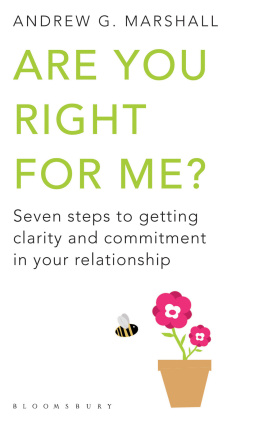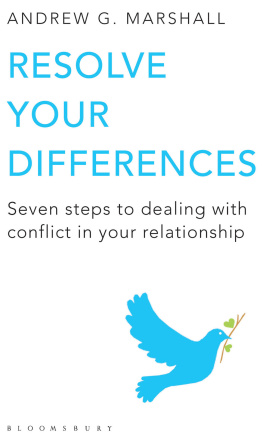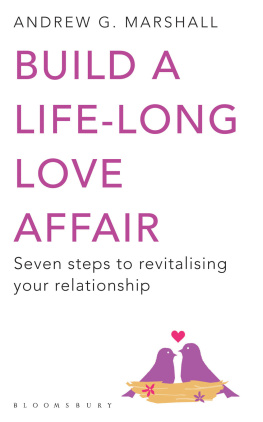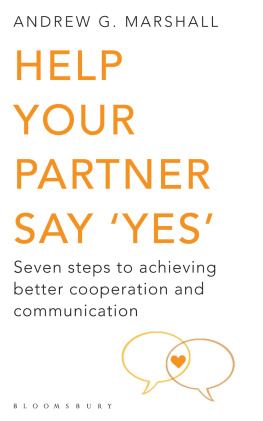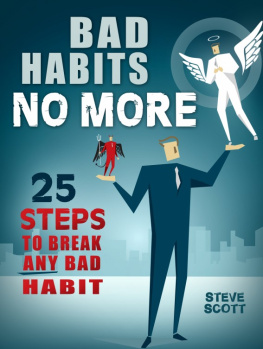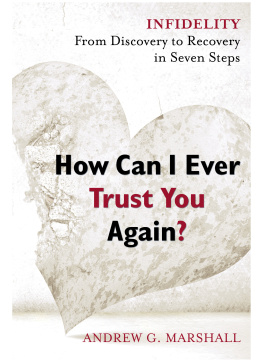Andrew G. Marshall is a marital therapist and the author of I Love You But Im Not In Love With You: Seven Steps to Saving Your Relationship , The Single Trap: The Two-step Guide to Escaping It and Finding Lasting Love and How Can I Ever Trust You Again?: Infidelity: From Discovery to Recovery in Seven Steps . He writes for The Times , the Mail on Sunday , the Guardian , Psychologies and womens magazines around the world. His work has been translated into over fifteen languages. Andrew trained with RELATE and has a private practice offering counselling, workshops, training days and inspirational talks.
www.andrewgmarshall.com
1. Make a Good Ending
How you separate will affect your prospects for happiness over the next few years.
If you are getting divorced, try to keep it as civilised as possible without guiltily giving your rights away, taking flight to get it over and done with, or dragging it out for sadistic or masochistic reasons.
If you find yourself fighting for a matter of principle it is normally a sign that you are trying to punish your ex-partner or are looking for the courts to prove your goodness and your ex-partners badness. This is nearly always a dead-end and only increases the pain.
Perhaps you feel hurt and believe that you need redress. In twenty-five years of working with relationships in crisis, I have yet to meet a couple with a wholly innocent or a wholly guilty party. Generally the problem is six of one and half a dozen of the other. If you feel more sinned against than sinning and therefore justified in punishing your ex-partner, be aware that he or she will only see this bad behaviour (because your ex will have either discounted or forgotten all the contributing factors) and feel, in turn, justified to strike back. Without knowing it, you have reached a negative tipping point and bitterness will overwhelm not only your dealings with your ex-partner but everybody else you meet.
Bitterness is one of the least attractive human emotions, along with contempt and vengefulness. It repels rather than attracts possible future partners.
Checkpoint: Think back over the past week. What kind act have you made towards your ex-partner? If you can think of nothing, look back over the past month. If you still draw a blank, what small act of kindness could you perform? Dont worry, it only has to be small like forwarding on his or her post.
2. Resolve and Contain New Arguments
When you have children, there are a multitude of day-to-day issues to resolve. Even couples who only have to unravel their financial affairs find plenty of potential disputes.
Try to be as rational as possible during disputes, as racking up the anger can bring unbidden flashbacks or refuel past hurts and keep you bound into the old relationship.
An act of generosity will not only help you move on but also encourage your partner to respond in a similar manner. In this way, you will reach a positive tipping point and it gets easier to contain your feelings; being civilised becomes easier too.
Checkpoint: Arguments are easier to resolve if you deal with one issue at a time. To stop yourself moving on to another problem, before resolving the first, put an elastic band round your wrist. When you are on the phone to your ex-partner and feel the temptation to say... and another thing, ping the band. The small moment of pain will distract you for long enough to break the habit. Afterwards, make a note of your issue and think of bringing it up another time. Often, however, it is not really that important.
3. Mourn the Loss
When we are in pain, it is natural to want to move on as quickly as possible but that is not possible if you are still angry.
So how do you get rid of the anger especially if fighting with the ex-partner, revenge and getting even will increase rather than decrease it?
Dont be afraid to cry. Tears reduce anger significantly and even in the most destructive relationship you can cry for the lost dreams and hopes for the future.
Craving and mourning can easily be mistaken for each other. Thinking a lot about your ex doesnt automatically mean that they were the one and that you will never recover. More likely, you are slowly processing what happened, understanding your regrets and beginning to heal.
Unfortunately, some people dont allow themselves to mourn and remain tied into an old relationship either fantasising about the moment that their ex sees the light and returns, or becoming a voyeur in his or her new life by using the children as spies.
Checkpoint: Ask a trusted friend for a second opinion on how well you are mourning the loss of your relationship. Explain that you want a truthful rather than a cheerleading response. Its nice to hear: Youre doing wonderfully but it is ultimately a dead-end. If you feel stuck, discuss with your friend: What are the benefits of me staying where I am? There must be a hidden benefit or why would you be doing it? (Generally, it is to avoid pain or out of fear.) Finally, ask your friend to spot any behaviour that might be keeping you trapped.
4. Rediscover yourself
At the beginning of a relationship, a couple have to transform themselves from two separate individuals into one partnership.
To this end, couples pool their talents and one partner, for example, cooks while the other fixes things around the house. On a deeper level, one person might look at a problem rationally while the other looks at the emotions.
This team-building means that we invest our partner with special talents: You are good with money or You are brilliant at solving disputes between the kids. Often we deliberately forget some skills in order to make our partner feel wanted or special or lose them through neglect.
Now, your task is to unpick that bond and remember the talents that have lain dormant over the relationship.
Checkpoint: Think back to your life before your relationship: What were your interests? What were your ambitions? What did you have to give up because there was not enough time or because your ex-partner actively discouraged it? Then, remembering the old you, imagine introducing him or her to yourself: What would the old you recognise about your life today? What would the old you be surprised about? What would the old you applaud? What would upset him or her?
5. Venturing Forth Again
Often people lose confidence in their judgement after divorce or a relationship breakdown: How could I have been so stupid...?
If this is you, plan just for the short or medium term. Worrying about the future will overwhelm and frighten you. For the time being, it can look after itself.
If you are worried about flying solo on social occasions, start with places that are not couple-orientated. For example, learning a new skill at an adult education centre.
Checkpoint: Ending a relationship is sad but it offers new adventures. Instead of being depressed about the blank spaces in your diary that used to be filled by couple time look at the opportunity of doing something new. The future is out there waiting for you. This is your chance, embrace it.
Final nutshells for both Leavers and Stickers:
It does not matter which side of the splitting-up divide that you started, the destination is still recovery.
Change might not be popular but there is an upside to nothing lasts for ever. It not only guarantees that all pain will pass, but also makes the fleeting golden moment that little bit sweeter.
Change brings with it new opportunities, new adventures and opens new doors.
First published in Great Britain 2011
This electronic edition published in 2011 by Bloomsbury Publishing Plc
Copyright 2011 by Andrew G. Marshall
All rights reserved
You may not copy, distribute, transmit, reproduce or otherwise make available this publication
Next page
